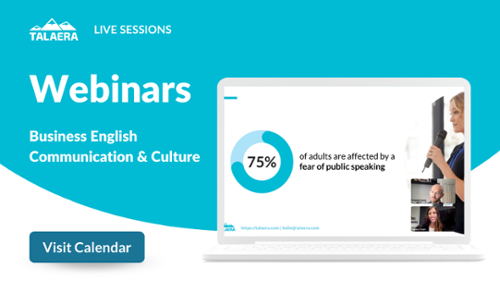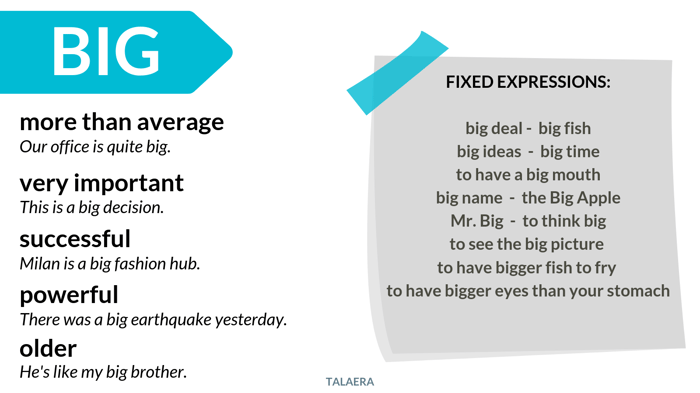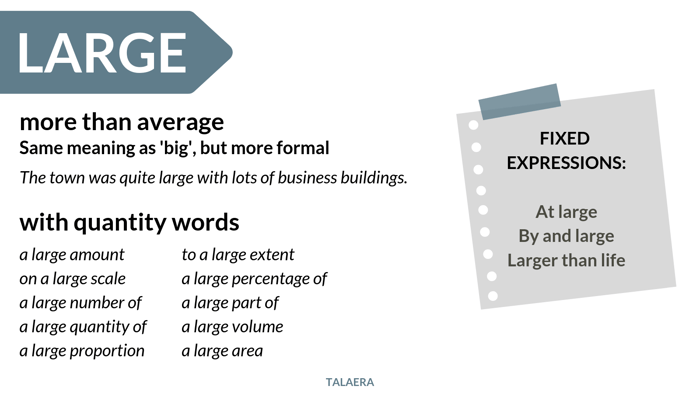Big VS Large – Are They The Same? (Includes Exercises!)
Are big and large the same? The answer is – more or less, and only sometimes. I know, I know, that didn’t solve much. But in this post, we will look at how ‘big’ and ‘large’ are similar in some ways, and different in others. At the end you will find an activity with solutions to practice and make sure you understand the difference. And if you prefer to practice with a native teacher, get more info here.

Are ‘big’ and ‘large’ similar?
Yes, in many ways, they are similar. They are both adjectives that usually mean more than average size, amount, extent, weight, length… Big can refer to the physical size of an object, but it also means that something is serious or important, while large only refers to the physical size. They can only be used with countable nouns: a big city, a large company. But not with uncountable nouns! Instead of saying ‘big traffic,’ say ‘a lot of traffic.’
How are ‘big’ and ‘large’ different?
Big and large seem very similar, but there are clear differences between these two.
In terms of frequency, big is a very common word in English (did you know it’s in the top 1,000 most frequently used words?). Large, on the other hand, is much less common (it doesn’t even make it to the top 3,000!).
Keep reading and find out exactly when to use each…
When should I use ‘big’?
For the following examples, use big (sorry, large, we don’t want you here!).

1. When you mean ‘very important’
- “Moving to a new country is a big decision.”
- “Winning this contest is a big thing.”
2. When you mean ‘older’ (informal)
- “Have you met my big brother yet?”
3. When you mean ‘powerful’ or ‘successful’ or ‘of a large degree’
- “Milan is a big fashion hub.”
- “She is a big fan of that movie.”
- “People of our generation are big social media users.”
- “There was a big earthquake last night.”
4. When you use any of the following fixed phrases:
- Big deal: an important thing or person. “Don’t worry, it’s no big deal.”
- Big fish: an important, successful or influential person. “Meeting a big fish like the company’s CEO can be quite an intimidating experience for an intern.”
- Big ideas: impressive plans. “The reason why I like the new manager is because she has big ideas for this company.”
- Big time: a lot, significantly. “This time they’ve messed up big time.”
- Big name: a person or a company of great importance, fame, success or reputation. “There will be a lot of big names at the conference tomorrow.”
- The Big Apple: nickname for Manhattan. “We spent the weekend in the Big Apple.”
- Mr. Big: the most important person in a group or business. “I met Mr. Big last night. I imagined him much taller, to be honest.”
- To think big: to be ambitious. “You have to think big to achieve great things.”
- To see/To focus on the big picture: to focus on the most important parts of a situation, rather that the smaller details. “We need to focus on the big picture if we want to finish the project on time.”
- To have a big mouth: to be a gossiper; to be a person who tells secrets. “Be careful with him, he has a big mouth.”
- To have eyes bigger than one’s stomach: to take/buy more food than one is actually capable of eating. “I can’t finish my meal, I always have eyes bigger than my stomach.”
- To have bigger fish to fry: to have more important things to do. “It’s really not worth my time. I’ve got bigger fish to fry!”
When Should You Use ‘Large’?
There are quite a few examples when big is the word you have to go for and, as we mentioned before, large is less frequent than big. However, that doesn’t mean large is not common at all. Check out the situations where you should use large.

1. Use large with quantity words
Those words include: ‘a large amount’, ‘on a large scale’, ‘a large number of’, ‘a large quantity of’, ‘a large proportion’, ‘to a large extent’, ‘a large percentage of’, ‘a large part of’, ‘a large volume’ and ‘a large area’.
- “We invested a large amount of money in that project.”
- “We have other points to cover but, to a large extent, the new company policies are the reason for the meeting.”
- “Our headquarter premises cover a very large area on the outskirts of the city.”
2. Use large for for body sizes
Following the convention, clothing sizes are Small (S), Medium (M) and Large (L). In very rare occasions will you see Big (B) instead. And the cool thing is – these sizes are pretty much universal, you can use them basically anywhere around the world.
The same way, we can use large when referring to a person of big dimensions. Calling someone ‘fat’ or ‘chubby’ does not sound nice to anyone’s ears, so in most cases, it is better to leave it out and not mention it. However, if you really need to describe someone and you have to mention their ‘largeness’, it sounds nicer to say large than anything else.
- “Please, go talk to the chairman of the conference, he’s super nice and helpful. If you don’t know him, he is the large man in the navy suit.”
3. Use large with the following fixed phrases
- At large: free, not captured yet. “The police haven’t caught the thief yet; he is still at large.” *At large also means ‘in general’: “There has been a loss of community values in society at large.”
- By and large: in general, overall. “By and large, the company has been very good to me over the last couple of years.”
- Larger than life: a person that attracts special attention because of their flamboyant appearance or behavior. “I’ve always thought that the marketing manager seemed larger than life.” *Larger than life also means ‘something that seems disproportionately important’: “Your problems always seem larger than life at that time of night.”
Time to practice!
Complete the following sentences with big (or bigger) and large (or larger):
- 1. Have you seen the new office? It’s really ___.
- 2. I told you not to trust him. He’s got a ___ mouth.
- 3. They must have invested a ___ amount of money in that building.
- 4. The new hire seems very ambitious, I like how she thinks ___.
- 5. Quitting your job is such a ___ decision!
- 6. New York is an expensive city but, by and ___, I love to live here.
- 7. My manager is always very kind with me, he feels like my ___ brother.
- 8. I’m not a ___ fan of meetings.
- 9. A ___ percentage of our employees prefer to have Sundays off.
- 10. You haven’t heard of Mr. Bauer? He’s a ___ fish.
- 11. You like that actor? He’s always seemed ___ than life.
- 12. What I like about her is that she always sees the ___ picture.
- 13. I don’t want to keep calling him, I’m sure he has ___ fish to fry.
- 14. Most tax evaders are still at ___.
- 15. To a ___ extent, our recruiting team is aware of unconscious bias and are working towards overcoming it.

Still got some questions?
We got you covered. If you would like to improve your vocabulary and grammar in an interactive and effective way, Talaera’s 1:1 sessions with professional teachers is what you need. Want to know more? Let’s talk!
Oh, and remember you can download this guide in PDF!

Did you enjoy this post? We have more like this:







